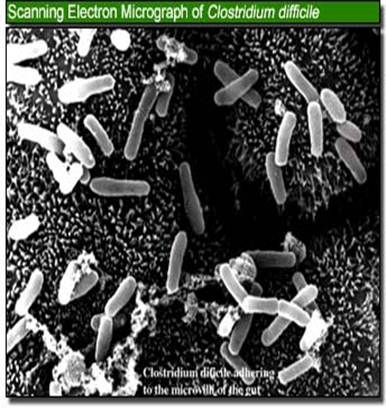
What is Clostridioides difficile?
Clostridioides difficile (C. difficile or C. diff) is a bacterium that is normally present in the body in small numbers. However, disruption of the body’s normal balance of bacteria can allow C. difficile to grow and cause infection, resulting in diarrhea.
What type of disease does Clostridioides difficile cause?
C. difficile produce a toxin. Therefore, infection with these bacteria causes colitis, or inflammation of the colon. The colon inflammation results in diarrhea, and sometimes blood.
Who does it affect?
C. difficile toxin has been found in the stool of normal term newborns and infants in the neonatal intensive care unit. However, most infants who have toxin in their stool show no symptoms. While older children and adults may sometimes have C. difficile in their stool and not be ill, we usually identify C. difficile in patients with diarrhea.
What are the risk factors for this infection?
If your child has recently used antibiotics or been hospitalized, your child may have increased risk of C. difficile infection. Children who have low immune function or have been diagnosed with inflammatory bowel disease also have higher risk. Infection also can sometimes be related to prolonged use of acid suppressants.
What symptoms will my child have?
Your child may have mild watery diarrhea that lasts only a few days and resolves on its own. In some children, the symptoms may persist for months with associated blood.
Severe infection may lead to pseudomembranous colitis. This is an inflammatory bowel disorder in which yellowish patches form on the damaged intestinal lining. Your child may have high fever, high white blood cell count (called leukocytosis), and low blood albumin levels.
In patients with inflammatory bowel disease (IBD) who have symptoms and also test positive for C. difficile, it can be difficult to tell if the C. difficile or the IBD is the cause of the symptoms
What tests are used to determine the cause of the colitis?
Your doctor will ask you to bring in a stool sample from your child. Your child’s stool will be examined for blood and leukocytes. Testing will determine if the bacterium or its toxin is present in the feces.
How is this colitis treated?
Treatment depends on severity of the colitis. If your child has mild diarrhea caused by C. difficile, stopping any other antibiotic treatments may be sufficient therapy.
For severe illness, including pseudomembranous colitis, treatment could instead include antibiotics. Metronidazole is usually the first-choice antibiotic. Vancomycin may be prescribed instead.
Treated children often get sick again within a month after completing treatment. This is often because bacterial spores remain in the body from the first infection, and is not due to incorrect treatment.
If your child develops recurrent C. difficile infection, he or she may benefit from a second course of antibiotic, sometimes with a gradual taper of the antibiotic. In patients with frequent recurrence, your doctor may prescribe another antibiotic, such as rifaximin or fidaxomicin.
It is important to know that antibiotics are usually not given to children younger than 3 months old.
What other treatment can my child be given for this colitis?
Additional treatments include probiotics and toxin binders (cholestyramine). In some children and adults with recurrent C. difficile, fecal microbiome transplant may be recommended. This treatment is used to add healthy bacteria back to the digestive tract. This treatment involves taking fecal material (stool) from a healthy person, processing it, and giving it to a patient with C. difficile. While it is not known precisely how this works, it is believed the healthy bacteria in the donor stool (stool from the healthy patient) prevent the C. difficile from growing back into the patient. For a fecal transplant, the feces are treated before being transplanted. Transplants are given through a colonoscope, through a tube inserted through the nose into the stomach, or by having a patient swallow capsules containing fecal material from a healthy donor.
What can I expect if my child has C. difficile infection?
There may be some weight loss from diarrhea, with possible dehydration. It is very important to give your child plenty of fluids. Good handwashing is important to prevent spreading the infection.
If your child continues to have diarrhea with no wet diaper or decreased urination and with other evidence of dehydration, contact your doctor.
If your child has watery stool containing blood, please seek medical care.
IMPORTANT REMINDER: This information from the North American Society for Pediatric Gastroenterology, Hepatology and Nutrition (NASPGHAN) is intended only to provide general information and not as a definitive basis for diagnosis or treatment in any particular case. It is very important that you consult your doctor about your specific condition.
Revised April 2019




